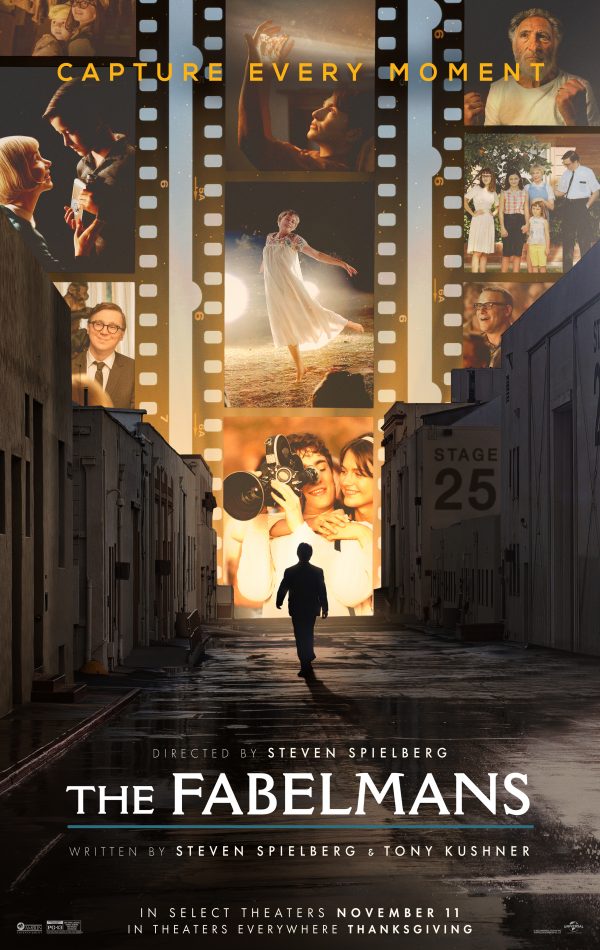
“The Fabelmans” (2022). Cast: Michelle Williams, Paul Dano, Gabriel LaBelle, Judd Hirsch, Seth Rogen, David Lynch, Mateo Zoryon Francis-DeFord, Keeley Karsten, Alina Brace, Julia Butters, Birdie Borria, Sophia Kopera, Robin Bartlett, Jeannie Berlin, Sam Rechner, Oakes Fegley, Chloe East, Isabelle Kusman, Chandler Lovelle, Stephen Smith. Director: Steven Spielberg. Screenplay: Steven Spielberg and Tony Kushner. Web site. Trailer.
When we look upon the works of gifted artists – regardless of the medium involved – we’re often tempted to wonder where the abilities that gave rise to them came from. To be sure, much of the credit obviously belongs to these creative types themselves, but still there are other influences that help to nudge their talents to the surface, inspirations that bring out their innate skills and enable them to flourish. Such is the intent underlying director Steven Spielberg’s coming of age story about an aspiring young filmmaker in the new less-than-veiled autobiographical offering, “The Fabelmans.”
In 1952, a young Sammy Fabelman (Mateo Zoryon Francis-DeFord) attends his first movie, a screening of Cecil B. DeMille’s “The Greatest Show on Earth,” with his parents, Mitzi (Michelle Williams) and Burt (Paul Dano). Mom and Dad are enthusiastic about the event, convinced that their son will thoroughly enjoy the experience. However, some of the film’s action-packed scenes are a bit overwhelming for the youngster, particularly one involving a violent train crash, leaving him somewhat unnerved. Sammy’s reaction leaves Mitzi and Burt wondering if they had done the right thing taking him to the cinema. But, despite the boy’s unsettled response to the picture, there’s still something about what he saw that captivated him, especially when he asks for a toy train as a Hanukkah gift. What’s even more curious, though, is what happens next, when Sammy deliberately crashes the train after setting it up.
Mitzi is mystified and intrigued by what happened, though given the uncanny similarity between Sammy’s staged toy train accident and what they together saw on the movie screen, she encourages him to re-create the crash, this time prompting Sammy to photograph it with Burt’s 8-mm camera. And Mom’s astounded by what she sees – a cinematic sequence created with a level of sophistication far beyond what most people would typically expect out of someone of such a tender young age.
Mitzi thus takes a strong interest in Sammy’s capabilities. As an artist herself – a gifted classical pianist – she would love nothing more than to see her son thrive at something for which he possesses a genuine talent. And, with a developing passion for the cinematic artform, she truly hopes he’ll pursue it with zeal. In addition to seeing his abilities blossom, the experience also provides her with an opportunity to live vicariously through him, having mostly abandoned her own artistic calling to live the life of a wife and mother, a choice that seems to carry more than its share of regrets.
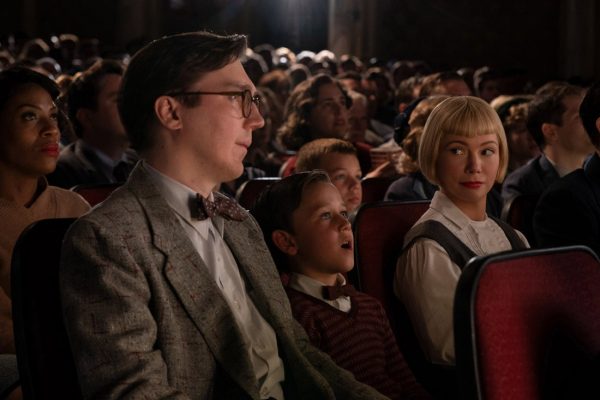
As for Burt, he provides Sammy with the means to carry on with his filmmaking, though he sees his son’s ventures as a hobby more than a springboard to a future career path. Dad is ever the pragmatist, firmly believing that he and his children should pursue “realistic” undertakings that will enable them to become good providers. That’s even reflected in his own work as an electrical engineer, a vocation with a solid, rational, science-based foundation (and one with ample future growth potential at the time). But that no-nonsense outlook is often at odds with the artistic sensibilities of his wife and son, qualities he can’t fully appreciate, given that such pursuits don’t seem to possess the obvious tangible economic and professional payoffs of a serious career track.
It’s not that Burt is cold, hardnosed and inflexible; far from it. He’s warm, sensitive and loving, even if not terribly imaginative or impulsive. He’s willingly sacrificed such “frivolities” to create a nurturing environment for Mitzi, Sammy and his three daughters (Alina Brace, Birdie Borria, Sophia Kopera). That goes for the Fabelmans’ extended family, too, including both of the children’s grandmothers (Robin Bartlett, Jeannie Berlin) and Burt’s best friend and co-worker, a jovial soul whom the kids have come to know as their Uncle Bennie (Seth Rogen). It’s the kind of environment that has enabled Sammy to grow and develop into his art, even if that’s not exactly what Burt had intended for him.
As Sammy grows into adolescence, however, the relative peace and contentment of the family’s suburban New Jersey household is disrupted when Burt announces that he’s landed a better job in Phoenix, AZ. This revelation sparks a discordant note between Mr. and Mrs. Fabelman, especially when Mitzi learns that it’s unlikely Bennie will be joining them in Arizona. Burt explains that this is because his friend likely doesn’t possess the required skills to land a position at his new company. But why should that upset Mitzi so much? This is the first indication that there may be some deeply rooted trouble at home, a discovery that the now-teenage Sammy (Gabriel LaBelle) slowly begins piecing together, particularly when Bennie somehow miraculously manages to land a position at Dad’s new employer not long thereafter.
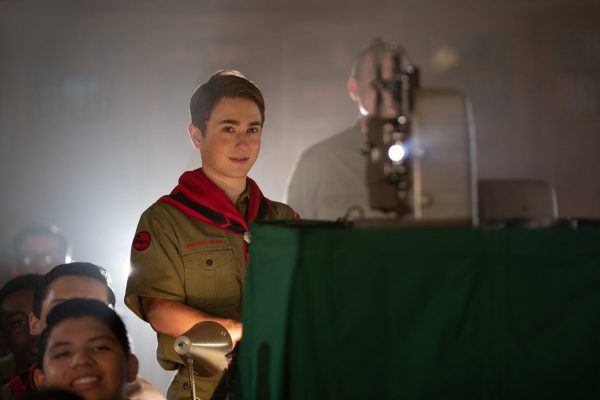
With the family relocated to the Grand Canyon State, they seek to settle in as readily as possible. Sammy continues with his filmmaking, growing ever more adept at his art. He has many friends who join him in his efforts, and he often includes his now-older sisters (Keeley Karsten, Julia Butters, Sophia Kopera) as featured stars in his productions. That family connection proves important to him, too, especially with the growing tension within the household. The widening disconnection between his parents and his increasing suspicions about Mitzi and Bennie – a hunch confirmed when he captures them on film in a compromising moment – frequently leave conditions strained at home, especially in Sammy’s relationship with his mother.
Then there’s Burt’s underwhelming support for the development of Sammy’s talents. He continues to provide him with the equipment and materials he needs to make his films, and Sammy’s productions genuinely impress Burt, leaving him a proud father when he sees the end results. But the real encouragement still comes from Mitzi, whose support receives a big boost from a surprise visit by her Uncle Boris (Judd Hirsch), a onetime lion tamer and film worker. Like Mitzi and Sammy, Boris has the artistic bent that runs through their family, and he fervently urges his grand-nephew to follow his calling, regardless of what others (like Burt) may feel. Boris is well aware that there are many who just don’t understand the nature of artistic sensibilities, and, for those who possess them, he advises that they simply ignore the oblivious viewpoints of others. Failing to go with one’s heart, he insists, will leave one feeling disappointed and unfulfilled, and he cites the example of Sammy’s Mom to illustrate that point.
Having been given his marching orders, Sammy looks to move ahead with his plans to become a filmmaker. But, just as those efforts get under way, there’s more upset in the household. Burt announces another new job opening, one that requires a relocation to Northern California. And, this time, Bennie won’t be coming along for the ride, a development that throws the future of Mitzi and Burt’s relationship into chaos.
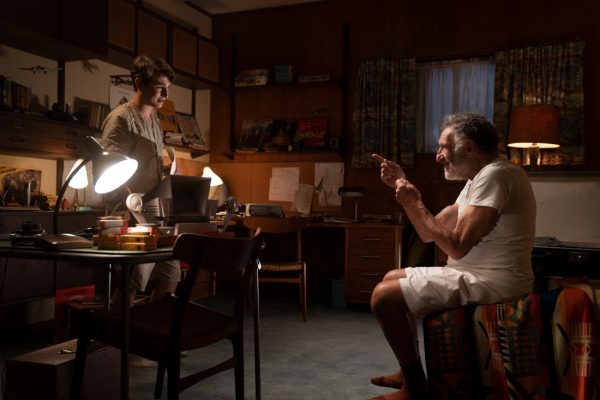
With Sammy now in high school, his experiences in Northern California bring him to the brink of adulthood. In addition to having to cope with the trouble at home, he also has his first taste of dealing with issues like the impact of antisemitism and bullying. At the same time, however, he also has an opportunity to experience the pleasantries of life, such as his first love, an unusual relationship between a young Jewish man and a quirky devotee of Jesus (Chloe East).
As difficult as this phase of Sammy’s life proves to be, it nevertheless represents a culmination of an upbringing that laid the foundation for an aspiring auteur’s future, one in which a multitude of influences came together to help shape him, his mindset, his worldview and a repertoire of works waiting to be filmed. Sammy’s story depicts the impact that the combination of art, a love of cinema, family, religious and cultural heritage, and the need to follow one’s impulses had in making him who he has become as a fully realized individual – and how that fully realized individual would then go on to become the artist that he was destined to be. It provides us with an in-depth look at seeing exactly who Sammy Fabelman is and how he got to be that way, and that, in turn, enlightens us as to why his art turned out the way that it did.
In that sense, then, given the parallels between this fictious character and the filmmaker who created him, it’s easy to say that this is as much a picture about Steven Spielberg as it is about Sammy Fabelman. The similarities in their stories are so in sync that it’s nearly impossible to see where one leaves off and the other begins, about the only real difference being in their names. This becomes especially apparent if one were to screen this movie in conjunction with director Susan Lacy’s excellent HBO documentary “Spielberg” (2017), which provides an in-depth look at the filmmaker’s personal and professional life. “The Fabelmans” is so precise in capturing this authenticity, in fact, that it incorporates big screen re-creations of home movies from Spielberg’s own upbringing. And, in light of the foregoing, these two films shed significant light on how Spielberg’s film career developed and why it turned out as it did.
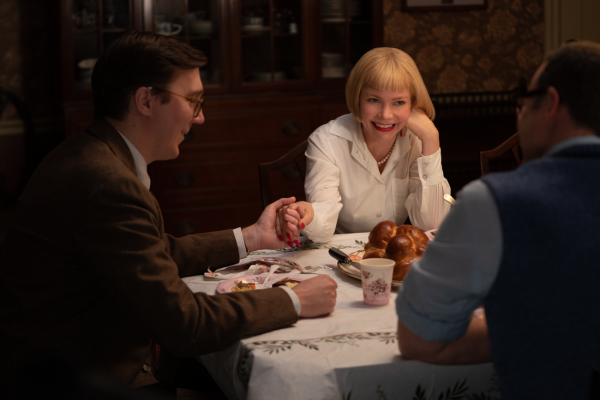
Even with the up-close insights provided here, though, one still might wonder why these particular experiences contributed to the shaping of Sammy Fabelman’s/Steven Spielberg’s life and career. However, there’s a significant clue provided in the film – Mitzi’s astute observation as she and her children are about to witness a potential calamity: the belief that “Everything happens for a reason.” While that statement might be seen by some as a piece of throwaway, warm fuzzy fluff, it rings true on so many levels, its deceptive simplicity revealing much about the nature of how reality functions. It’s a stepping stone statement that helps lead us to an understanding of the impact of our beliefs in the unfolding of our existence. If we indeed believe that everything happens for a reason, then nothing occurs by chance, that all of what we encounter has purpose, and the manifestation of those occurrences begins with us. Such is the essence of the conscious creation process, the philosophy that maintains we materialize the reality we experience through the power of our thoughts, beliefs and intents.
By no means is it clear whether Sammy Fabelman or Steven Spielberg have heard of this school of thought. However, after seeing what each of them has accomplished, in both fictional and realistic contexts, it’s apparent that both are adept at understanding and making use of its principles.
In Sammy’s case, for instance, we see these concepts proficiently put to use in the films he creates. His inventive use of technology and techniques (often of a low-budget nature) in his “amateur” productions reveals a tremendous capacity for imagination, especially when it comes to maximizing impact with limited resources. He’s able to get the most out of what he has to work with simply by leaving his mind open to tapping into expansive beliefs that make such an outcome possible. Imagine what that can enable when a vast array of resources is available (oh, wait a minute – we’ve seen that in many of Spielberg’s finished products).
In a parallel light, Sammy demonstrates a profound ability to draw to himself the circumstances he needs to come up with the stories he creates for his films. In many cases, his own life experiences provide him with a basis for the scripts he writes for his movies. Indeed, it’s often been said that we should draw upon our own experiences when we tell stories, as those are the ones with which we’re most familiar and that we can most readily translate into finished narratives. That’s something Sammy readily does here and that his real life alter-ego has been doing for decades, and it’s a skill most capably demonstrated in this latest offering of his.
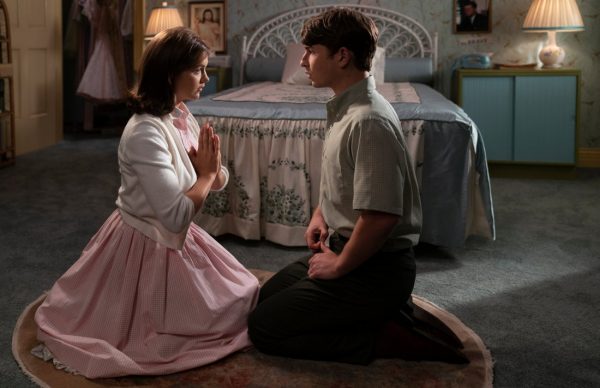
Taking on a project as big as making a movie can truly be a daunting task, one that could be intimidating if not scary. But that didn’t stop a young Sammy, even when some of the on-screen images he witnessed were somewhat frightening. He carried forward, overcoming those apprehensions and limitations, just as his real world counterpart has on numerous occasions (a topic he discusses at length in the aforementioned documentary). That’s yet another principle that’s integral to the manifestation process, one that, if not overcome, could easily leave us stuck in place, never allowing us to achieve our objective.
And, of course, achieving that objective is the ultimate goal of this process. Many call this the pursuit of our destiny. Those skilled in the ways of manifestation often refer to this as value fulfillment, the practice of being our best, truest selves for the betterment of ourselves and the world around us. Given the passions of the protagonist here, it’s obvious that making movies – for his own sake and that of cinephiles at large, not to mention for the sake of the art itself – is Sammy’s true destiny, arguably even his value fulfillment. And, considering that Sammy is modeled after the creator who made him, the same could just as easily be said of Mr. Spielberg. But, then, one need only look at his lengthy filmography as a writer, director and producer to see that at work.
“The Fabelmans” is, without a doubt, one of the best pictures about the love of moviemaking ever committed to film, easily in the same league as works like François Truffaut’s “Day for Night” (1973), Federico Fellini’s “8½” (1963), Woody Allen’s “Stardust Memories” (1980), Tim Burton’s “Ed Wood” (1994), Guiseppe Tornatore’s “Cinema Paradiso” (1988), Peter Bogdanovich’s “Nickelodeon” (1976), Robert Altman’s “The Player” (1992), Billy Wilder’s “Sunset Boulevard” (1950) and John Lee Hancock’s “Saving Mr. Banks” (2013). But, even more than that, it’s also an homage to the joy and power of the larger creative process, the fundamental intent underlying the act of manifestation. This is thus an inspiring work for anyone who has a desire to express himself or herself through acts of creation, handily one of the great passions that truly makes life worth living – and existence worth experiencing.
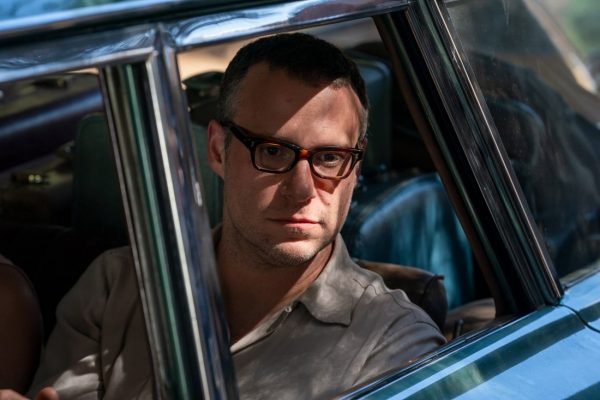
What’s more, “The Fabelmans” is easily Spielberg’s most personal film, as well as one of his best efforts in recent years. Its polished storytelling and fine period piece production values are top notch, as are the performances of its excellent ensemble cast (especially Williams and an all-too-brief appearance by Hirsch, both considered Oscar nominee contenders). As with many of Spielberg’s later films, this one, too, is a tad long in spots and occasionally somewhat episodic. Nevertheless, the film’s strengths allow this effort to shine as one of the best releases of 2022. as well as a strong contender as movie awards season plays out. The picture is currently playing theatrically.
Copyright © 2022, by Brent Marchant. All rights reserved.

No comments:
Post a Comment